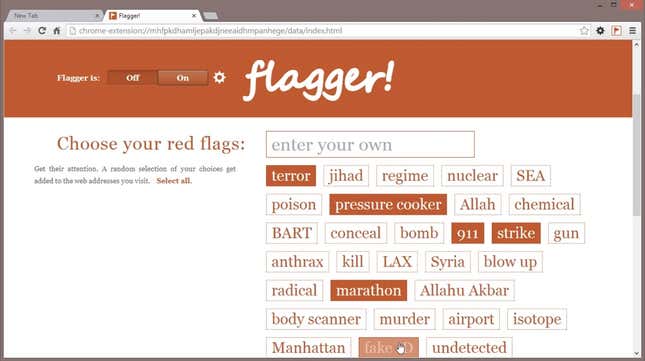
Flagger.io does just one thing: It adds a random selection of keywords, like “terrorist,” “pressure cooker,” “Al Qaeda,” etc. to the address of every website you visit. The idea is that, because the US National Security Agency (NSA) is gathering essentially all the internet traffic that passes through the US, the more noise it has to sort through—like the sort of faux-terroristic requests made by a web browser running Flagger.io—the harder the NSA’s job will be.

Lyon has also just released a second browser extension to help users thwart the NSA more directly: Turtl.it is an app for storing encrypted notes. (The main author of Turtl is actually Lyons’ brother, Andrew.) Eventually, says Lyon, it will also be usable for file storage—like Google’s document-sharing service, Google Drive. Because it’s open-source, users can be (relatively more) assured that it hasn’t been tainted by the NSA’s efforts to weaken commercial cryptography.
Here’s how Lyon describes the operation of Turtl.it:
We’ve set up our service so that only you have the keys to your data and it gets encrypted before it leaves your computer. That way, even if the NSA wiretaps your Internet connection, even if an army of mercenaries storms our data-center and steals our hard drives, your data is unreadable to everyone, including us.
The reason this matters, of course, is that as NSA whistleblower Edward Snowden revealed, the NSA can demand that Google hand over any data it has on you. But if the agency demands the data from Turtl.it, what it gets—in theory at least—will be useless.